Adios Tony

In 2012 I had the honor of traveling to Washington D.C. as part of the Guam delegation for the First Stewards Symposium, a gathering of native peoples associated with the US to discuss climate change. We performed at the National Museum of the American Indian and set up a display there of Chamorro cultural tools and artifacts. One of the highlights of the trip is that I got to spend time with Tony Ramirez, long time curator for the Guam Museum. I had known him primarily as the curator but through talking to him I learned so much more, even about his past as one of Guam's progressive activists and even participated in the Sella Bay protests of the 1970s. Guam has lacked a real museum for too long and it was always Tony's mission to see a new museum built and in use. He passed away earlier this year and it is truly tragic that he didn't get to see the museum he helped sustain for so long finished in Hagatna. While he was waiting for a new museum to be designed and built,




